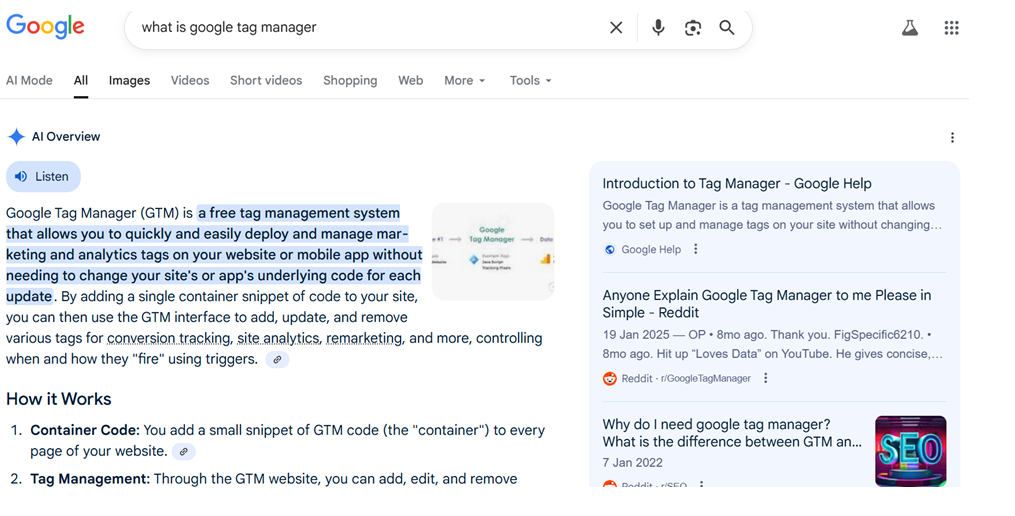When was the last time you actually clicked on a website link to get more information about the query that you were searching? The chances are that you must have glimpsed and read through the AI-generated summary that popped right at the top of the page.
Instead of clicking, visiting, and going through the content, you get the required information from the AI Overview, thereby saving you a click.
For users, zero-click searches are convenient, but what about brands that have long measured success by the click-rates and organic traffic? Well, AI-powered search results are the new reality that brands need to accept and ace their SEO game to master the zero-click searches.
Let’s understand more about how AI and zero-click searches are changing the way people search and how brands should make the necessary switch to AI search optimization.
What do Zero-Click Searches mean?
Zero-click searches occur when a user does a search on Google and gets the answer without clicking on any of the listed websites. That’s because Generative AI now provides direct, summarized, and holistic responses on the result page, leaving little need to visit the external sources.
For instance, if we search “what is Google Tag Manager”, then this is what Google shows:
 The AI Overview describes what Google Tag Manager is, how it works, and other aspects (like benefits), which means users can grasp the essentials without ever clicking through to a website.
The AI Overview describes what Google Tag Manager is, how it works, and other aspects (like benefits), which means users can grasp the essentials without ever clicking through to a website.
So, there is no need for the user to click on any other website because all the required information is served on the search results page itself. Hence, the name zero-click search and this is the future of SEO.
What Does Zero-Click Searches Mean to Brands?
As a brand, if you were already struggling to drive traffic to your website, now, you might have a struggle a bit more, all thanks to zero-click searches. Generative AI has dramatically accelerated the zero-click trend.
AI search engines, like ChatGPT, Claude, Gemini, and others, enhance the zero-click experience by providing detailed answers, recommendations while sending virtually no traffic to the external sources.
Does this mean zero-click searches will completely replace traditional search? Not exactly. According to Clickstream data analysis, users adopting AI tools are also turning more frequently to traditional search engines.
That’s because AI tools often provide brand names, concepts, or partial information that users then research further on traditional search engines, either to dig more about it or verify the information that AI just provided.
For instance, if someone asks AI to recommend the best telescopes, then the output will only include brand name, product name, and a short reason for the recommendation. This leaves the user to Google reviews, prices, or detailed comparisons before making a decision.
For brands, zero-click searches present a new opportunity. Visibility no longer depends on just ranking high, but on being featured in these summaries. To capture that spot, businesses need to refine their SEO strategy into AI SEO. This means that content should be optimized for authority, relevance, and structured data to get a mention in an AI-driven search result.
What Search Types Generate Zero Clicks?
The various categories of zero-click search optimization comprise informational, navigational, commercial, and transactional searches. These categories are based on the overall intention of a search by a user.
| Search Type | Zero-click Chances | Description | Examples |
| Informational | Medium | Informational search queries are, that which people require to learn something, and they take the form of questions, beginning with the terms of what, why, or how. | “Coffee calories”
“National coffee day” “What is the difference between cold brew and iced coffee?” |
| Navigational | Medium | Navigational search guides the searcher to a certain page or site. It is usually a navigational query, typing a brand or a website name into a search engine. | “Youtube”
“Semrush blog” “Where is angelino’s coffee located?”
|
| Commercial | Medium | Commercial searches are used to assist individuals in researching certain products or services. They can review, compare or seek discounts. | “Free coffee”
“Dunkin iced coffee flavors” “Peet’s cold brew vs starbucks cold brew” |
| Transactional | Low | Transactional searches reflect the most significant intentions to purchase or perform an action. Direct them through advertisements and customized product pages or a landing page where they can take action at once. | “Buy crypto online”
“Sandwich places near me that deliver” “Pickup truck for sale” |
Other searches also exist, such as local business searches. Concentrating on intent, though, allows you to determine how to outrank in search engine result pages (SERPs). The intent of the searcher indicates whether the searcher is willing to purchase, browsing, or simply learning. The search features that lead to zero-click searches are:
- Featured snippets
- Local map packs
- Knowledge panels
Although all these features play a role, AI-powered search results have become a driving force.
How do AI and Zero-Click Searches Impact SEO?
Zero-click searches have several effects on the future of SEO, such as:
Visibility
Zero-click search not only affects traffic, but it also affects visibility. The reason is that the search features driving zero clicks, such as AI Overviews and featured snippets, reduce the exposure of the 10 blue links in conventional search results.
The drop in visibility is even greater in the case of AI search experiences, such as AI Mode, ChatGPT, and Perplexity. It is because these experiences refer to their sources as opposed to listing down the relevant pages that users may access.
Traffic
Undoubtedly, zero-click searches affect traffic, which is one of the usual SEO indicators. In terms of traffic and zero-click searches, the most common thing you will hear is that platforms, be it search engines or social media networks, are currently more concerned with holding the traffic back to them rather than sending users to the web.
Journey Insights
Under zero-click searches on AI Overviews, Perplexity, and other AI search engines, the user can access the content of a company without the company knowing it. This forms a blind spot to the business, as they are unaware of what is (and is not) performing well in their SEO strategy. The only thing they know is that a new sale was made through a direct visit and not through an organic visit.
This is why several SEOs are requesting Google and other search engines to offer segmented tracking of AI search experiences, such as AI Mode and AI Overviews, which are already eligible as Web search types in the Google Search Console.
Downstream Metrics
A major issue affecting the implications of zero-click searches on SEO is in the downstream measurements, such as leads, In-store visits, App downloads, and Sales.
The trend, however, has been the businesses reporting reduced traffic, yet higher revenue. The reduction in organic search traffic has been reported by public companies, including NerdWallet and HubSpot, but their revenue has grown. If you don’t know how to get started with AI SEO transformation, then an SEO agency can help in creating a strategy.
Steps To Optimize For Zero-Click Search
As the search share of Google is caught by AI platforms, we should also consider how we can gain presence in such spaces, like Answer Engine Optimization. This is even more critical with the recent introduction of AI Mode by Google in the US and now India (with more to come) in the field.
Then, how to optimize in a world of these Answer Engines? Here are ways if you’re looking for zero click search optimization:
1. Structure content with retrieval in mind
Search users who choose to visit your site, rather than using AI Mode, need to look for something, and that is more important. Think of your content as building blocks, where every paragraph must be understandable. When they come to your site, it is important to have content that:
- Offers value, such as in visuals, first-hand experience, or engagement.
- Uses headings, lists, and tables to make it skimmable.
- Breaks down into details in its recommendations, such as what B2B and B2C companies require.
- Has a call-to-action, either micro or macro-conversion.
2. Use schema where it matters
Schema markup can help Google to interpret your content more richly, and thus may let you appear in rich results. By using schema markup, you can improve your content rankings in AI (artificial intelligence) search experiences:
- Add FAQs, HowTo, and Organization schema
- Test using Rich Results of Google
- Add Service and Product
These engines are significantly enhanced by a schema that can give your URLs better visibility. There are currently around 800 types of schemas and a zero-click search optimization expert can help in strategically implementing the right one.
3. Focus on omnichannel marketing
Zero-click results (like AI summaries, featured snippets, People Also Ask, Google Business panels, etc.) often mention brands users already recognize. If your brand is consistently visible across social media, email, search results, marketplaces, and offline channels, AI search engines are more likely to pick you as a credible example.
Also, AI-powered search results often draw information from Google Maps reviews, LinkedIn company descriptions, Instagram captions, or even YouTube transcripts. So, a well-synced omnichannel strategy ensures your brand messaging is uniform everywhere. This increases your chances of inclusion in AI recommendations.
4. Target the right keywords
Focus on keywords that trigger local pack, PAA boxes (People Also Ask), and featured snippets. It is because these SERP features will probably lead to clicks and increase brand awareness. So, whenever you perform keyword research, pay close attention to SERP features that a particular keyword could trigger. This will just make sure the keyword that you are targeting is worth the effort or not.
Conclusion
Zero-click optimization has become critical to being competitive now, especially as search engines have improved ways to answer users’ queries directly.
Zero-click searches continue to grow and become the “norm”, particularly where AI Overviews exist. It means SEO professionals and digital marketers must adjust their strategies to focus on visibility, brand awareness, and value within the search results and social platforms.
Ready to adapt your SEO strategy for zero-click searches? Reach out to the Ice Cube digital team today for professional SEO services and see how we can help modernize your strategy.
FAQs
1. How often do people do zero-click searches?
Zero-click searches are becoming more common and now make up a significant part of all search queries. Recent research indicates that over half of searches might not result in any clicks. This highlights the need to enhance these types of results.
2. How are SEO and search strategies changing due to zero-click?
In June 2019, zero-clicks outnumbered all other browser-based searches on Google for the first time. The rise of zero-clicks can make it harder to measure SEO efforts, and SEO strategies must adapt to search that brings in less direct traffic.
3. What are the ways to optimize for zero-click searches?
There are several strategies you can use to optimize for zero-click searches, including:
- Optimizing for local SEO
- Carefully targeting keywords
- Structuring content to provide clear, concise answers
- Answering common questions
- Adding schema markup
4. Is it fair for Google to show zero-click answers?
Google is focused on providing the best experience for the user, which typically involves having a concise answer at the top of the SERPs. Google then almost always links to the websites where they are pulling the information to give the user the option to click the site for further information.
5. Can zero-click results help a brand build trust?
Yes, zero-click results can help establish your brand reputation. When your website shows up at the top of the results, more people are going to take notice of your brand and understand what you’re talking about and that you’re trustworthy. The more a brand is seen, the more trusted it tends to become.







